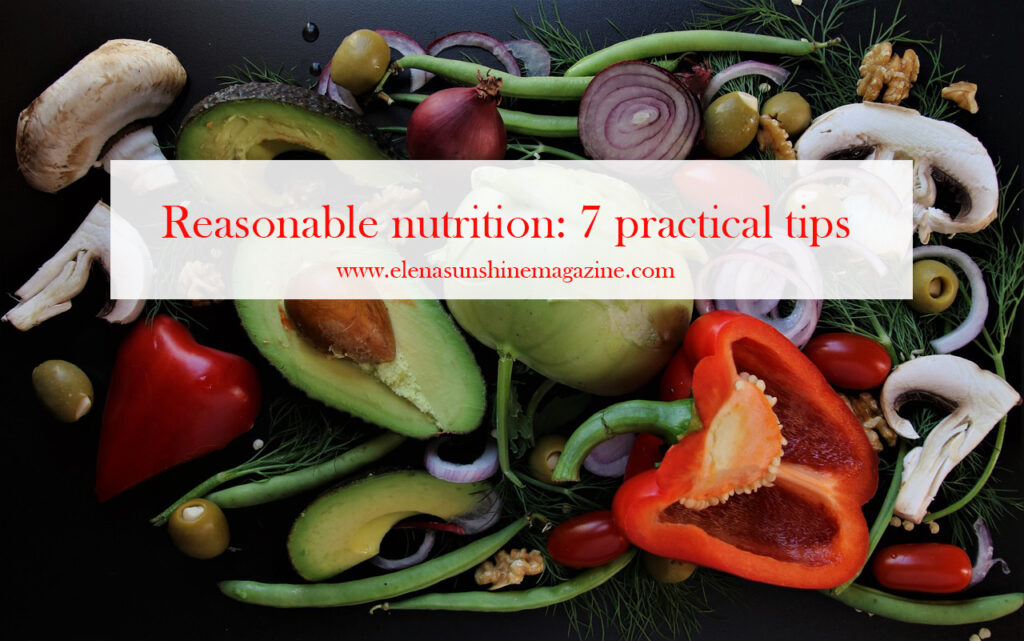Thanks to a sustainable approach to your own diet, you can significantly reduce your environmental impact. Reasonable nutrition: 7 practical tips.
According to the definition by the Food and Agriculture Organization of the United Nations (FAO), a sustainable diet is “a diet that is characterized by a low level of environmental impact and which contributes to ensuring food security and nutrition, as well as a healthy lifestyle for today and future generations. Sustainable diets contribute to the protection of biodiversity and ecosystems, they are culturally acceptable, affordable, fair from an economic point of view and inexpensive, full-fledged, safe and healthy, aimed at the rational use of natural and human resources.”
The most effective strategies are to reduce the consumption of animal products and throw away as few products as possible. But you can do even more.
(1) – “Integration of nutritional and sustainable aspects is a complex task tackled by a few scientific concepts. They include multiple dimensions and functions of food systems trying to provide solutions for harmonic co-evolution of humanity and planet Earth. “Nutritional Sustainability” is differentiated from other concepts which combine nutrition and sustainability as it not only sets environmental sustaining capacity as a baseline level for balanced nutrition, but also aims for the search of food system driving nodes. It does not aim for the support of solutions of producing enough or more food for increasing population (sustainable nutrition), neither does it contradict other similar concepts [sustainable nutrition security, nutritional life cycle assessment (LCA)]. However, it calls for more definite estimation of the carrying capacity of the environment on personal, local, and national levels for the development of more efficient solutions of nutrition balanced in the limits of environmental carrying capacity. The review is providing a few examples of advances in nutritional science (personalized nutrition, nutrigenetics), food technology (personalized food processing, food ecodesign), and food complex systems (artificial intelligence and gut microbiome), which have a great potential to progress sustainable food systems with Nutritional Sustainability set as a guiding concept.”
Why eat sustainably? Reasonable nutrition: 7 practical tips.
Nutrition has a significant impact on the environment. The production and transportation of food and beverages require a lot of resources and energy.
In addition, those who eat sustainably automatically eat healthier. So, what can you do?

#1. Throw away as little food as possible
Store the products correctly. So, some vegetables are better to keep in the refrigerator, while others are not. For example, leafy (lettuce, greens) and cruciferous (cauliflower, broccoli, Brussels sprouts, daikon, radishes, turnips) are best stored in the refrigerator. But bananas and other exotic fruits suffer from the cold.
#2. If you are not yet a vegetarian: eat less red and processed meat, especially beef
Of all food products, meat has the most destructive impact on the environment. Replace meat mainly with legumes – tofu, beans, lentils, peas, etc.
# 3. Eat less dairy products, and it’s better to give up altogether
Recently, models of sustainable dairy production have been actively developed in the dairy industry. But at the very heart of the production of dairy products, especially cheese, are processes that have a tremendous negative effect on the environment.
Varieties of vegetable “milk” vary in their effect on the environment. Oatmeal is considered the most ecological.
#4. Drink as little sugary drinks and alcohol as possible
Soft drinks, fruit juices, and alcohol have a great impact on the environment, and besides, they are harmful to your health. Therefore, from drinks, give preference to drinking water, tea, and coffee without sugar.
Of all the drinks, tap water is the least harmful to the environment. Water does not need to be heated, so its consumption is preferable.
Why is coffee the best choice in terms of sustainability? For example, in comparison with juices? Coffee has a sustainability certification, but fruit juices do not. For the production of sustainable coffee, honest working conditions and wages are created, among other things. For the production of fruit juices, a large amount of fruit is needed (it is easy to drink a glass of juice, but it is more difficult to eat the same amount of fruit from which this glass of juice is made). Juices should also be packaged in packages.
#5. Give preference to vegetable products
Choose products of vegetable origin: cereals, vegetables, fruits, legumes, nuts, seeds, and oils. Most plant-based products have a low environmental impact.

#6. Eat seasonal fruits and vegetables. Reasonable nutrition: 7 practical tips.
Fruits and vegetables generally have a less negative impact on the environment. If possible, buy fruits and vegetables in season and of local origin, this is even better.
Choose vegetables that have a low level of environmental impact throughout the year: broccoli, red cabbage, onions and leeks, beets, carrots, chicory, and celery.
Exotic varieties that get into our stores, transported by plane, naturally have a more negative impact on the climate. This also applies to greenhouse vegetables.
#7. Go to the store with your package
Plastic and other packaging materials are an additional stress for the environment. Get a special shopping bag and go to the store with it. Also, do not put each product in a separate package. Best of all, take containers for goods by weight with you.
(2) – “Nutritional Sustainability is differentiated from other concepts combining nutrition and sustainability via setting environmental sustaining capacity as aiming point, achievable via changing of key driving nodes for transformation of food systems. Current advances in nutritional science, food technologies, and complex food systems indicate that such a concept is emerging in the nearest future. Nutritional Sustainability concept does not contradict to other similar concepts (sustainable nutrition security, nutritional LCA), but it calls for more definite estimation of the carrying capacity of the environment on personal, local, and national levels and identification of key driving nodes able guiding the dynamics of entire system. Without such system boundaries and key driving nodes, theoretical and practical solutions would be limited in efficiency.”
(1,2) – A Path From Sustainable Nutrition to Nutritional Sustainability of Complex Food Systems. Sergiy M. Smetana, Sabine Bornkessel, and Volker Heinz.



